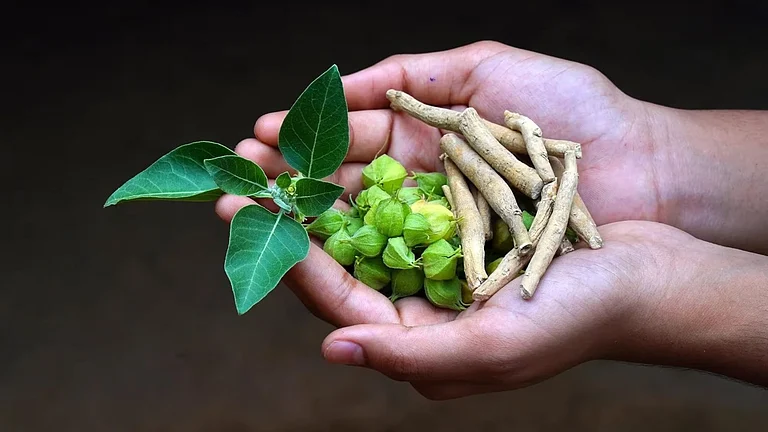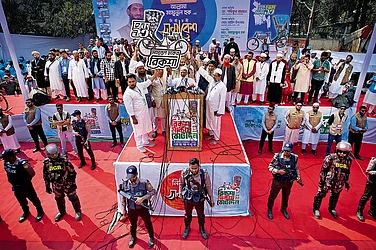During some of the darkest days of WWII, American philosopher Reinhold Niebuhr wrote the following, “Man’s capacity for justice makes democracy possible. But man’s inclination to injustice makes democracy necessary”.
Living through another tumultuous, dangerous moment in history, all of us have been horrified by watching the brutal invasion of Ukraine. The nuclear-armed despot’s response to neighbouring states whose only provocation is its desire to be independent, democratic. An invasion of this scale has not been seen in Europe since World War II. We have all witnessed death and destruction and displacement in real-time. The stakes are enormous. The courage displaced by ordinary Ukrainians has been extraordinary in demands I support.
Unfortunately, the war in Ukraine is not happening in a vacuum. Vladimir Putin’s aggression is part of a larger trend. Even if similar levels of repression and lawlessness and violence and suffering don't always attract the same levels of tension if they happen outside of Europe. The fact is autocrats and aspiring strongmen have become emboldened around the globe. They are actively subverting democracy, undermining hard-won human rights, ignoring international law.
Democratic backsliding is not restricted to distant lands. Right here, in the United States of America, we just saw a sitting president deny the clear results of an election, and help incite a violent insurrection at the nation’s capital. Not only that but a majority of his party, including many who occupy some of the highest offices in the land, continue to cast doubt on the whole legitimacy of the last election and are using it to justify the laws that restrict the vote and make it easier to overturn the will of the people in states where they hold power. For those of us who believe in democracy and the will of law, this should serve as a wakeup call. We have to admit that at least in the years since the Cold War ended, democracies have grown dangerously complacent.
Too often, we have taken freedom for granted. What recent events remind us is that democracy is neither inevitable nor self-executed. Citizens like us have to nurture it. We have to tend to it and fight for it, and as our circumstances change, we have to be willing to look at ourselves critically, making reforms that can allow democracy, not just to survive, but to thrive. That won’t be easy. A lot of factors have contributed to the weakening of democratic institutions around the world. One of those factors is globalisation, which has helped lift hundreds and millions out of poverty, most notably in China and India, but which, along with automation has also ended entire economies, accelerated global inequality, and left millions of others feeling betrayed and angry at existing political institutions.
There is the increased mobility and urbanisation of modern life, which further shakes up societies, including existing family structures and gender roles. Here at home, we have seen a steady decline in the number of people participating in unions, civic organisations and houses of worship, mediating institutions that once served as a kind of communal glue. Internationally, the rise of China as well as chronic political dysfunction, here in the US and in Europe, not to mention the near collapse of the global financial system in 2008, has made it easier for leaders in other countries to discount democracy’s appeal. And as once marginalised groups demand a seat at the table, politicians have found a new audience for old-fashioned appeals to racial and ethnic, religious or national solidarity.
In the rush to protect us from them, virtues like tolerance and respect for democratic processes start to look, not just expendable, but like a threat to our way of life. So if we are going to strengthen democracy, we will have to address all of these strengths. We will have to come up with new models for a more inclusive, equitable capitalism. We will have to reform our political institutions in ways that allow people to be heard and give them real agency. We will have to tell better stories about ourselves and how we can live together, despite our differences. And that is why I am here today on Stanford’s campus in the heart of Silicon Valley, where so much of the digital… because I am convinced that right now one of the biggest impediments to doing all of this, indeed, of the biggest reasons for democracies weakening is the profound change that’s taking place in how we communicate and consume information.
Now let me start off by saying I am not a Luddite, although it is true that sometimes I have to ask my daughters how to work basic functions on my phone. I am amazed by the internet. It has connected billions of people around the world; put the collected knowledge of centuries at our fingertips. It has made our economies vastly more efficient, accelerated medical advances, opened up new opportunities, allowed people with shared interests to find each other.
I might never have been elected president if it had not been for websites like, and I am dating myself, MySpace, MeetUp and Facebook who allowed an army of young volunteers to organise, raise money, and spread our message. That’s what elected me. And since then, we have all witnessed the ways that activists use social media platforms to register dissent and shine a light on injustice and mobilise people on issues like climate change and racial justice. So the internet and the accompanying information revolution have been transformative. And there is no turning back. But like all advances in technology, this progress has had unintended consequences that sometimes come at a price. And in this case, we see that our new information ecosystem is turbocharging some of humanity’s worst impulses.
Not all of these effects are intentional or even avoidable. They are simply the consequence of billions of humans suddenly plugged in one instant 24/7 global information stream. Forty years ago, if you were a conservative in rural Texas, you were not necessarily offended by what was going on in San Francisco’s Castro District because you didn’t know what was going on. If you lived in an impoverished Yemeni village, you had no insight into the spending habits of the Kardashians. For some such exposure may be eye opening, perhaps even liberating, but others may experience that exposure as a direct affront to their traditions, their belief systems, their place in society. Then you have the sheer proliferation of content and the splintering of information and audiences. That’s made democracy more complicated.
I’ll date myself again. If you were watching TV here in the United States between about 1960 and 1990, I Dream of Jeannie, The Jeffersons. Chances are you were watching one of the big three networks, and this had its own problems, particularly the ways in which programming often excluded voices and perspectives of women and people of colour and other folks outside of the mainstream. But it did fortify a sense of shared culture and it came to the news, at least, citizens across the political spectrum tended to operate using a shared set of facts, what they saw, what they heard from Walter Cronkite or David Brinkley or others.
Today, of course, we occupy entirely different media realities, fed directly into our phones. You don’t even have to look up, and it has made all of us more prone to what psychologists call confirmation bias, the tendency to select facts and opinions that reinforce our pre-existing worldviews and filter out those that don’t. So inside our personal information bubbles, our assumptions, our blind spots, our prejudices are not challenged, they are reinforced. And naturally we are more likely to react negatively to those consuming different facts and opinions; all of which deepens existing racial and religious and cultural divides.
It is fair to say then that some of the current challenges we face are inherent to a fully connected world. Our brains are not accustomed to taking in this much information this fast, and a lot of us are experiencing overload. But not all problems we are seeing now are a by-product of this new technology. They are also the result of very specific choices made by the companies that have come to dominate the internet generally and social media platforms in particular. Decisions that intentionally or not have made democracies more vulnerable.


























